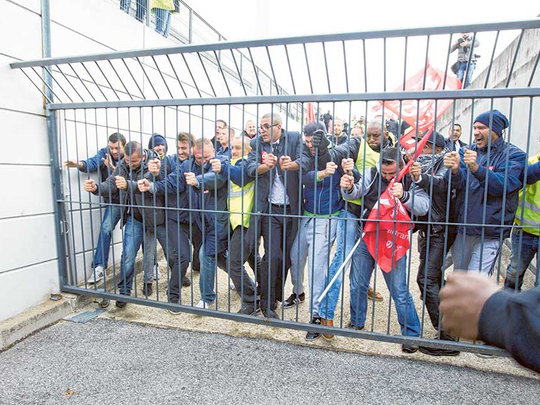
Paris: Pictures of Xavier Broseta, head of human resources at Air France, climbing shirtless over an 8-foot fence to escape enraged employees fit the stereotype of an ever-striking France: full of violent workers who won’t let companies move forward with sensible restructuring plans. France as a whole, however, has moved on from this style of labour relations. Air France is stuck in the past because it’s too big to fail.
The management of Air France-KLM feels hemmed in from all sides. The airline has lost money every year since 2011, undermined in Europe by low-cost airlines such as EasyJet and Ryanair and attacked on long-haul routes by Middle Eastern rivals such as Emirates, Etihad Airways and Qatar Airways. Its global market share by revenue slipped to 6.8 per cent last year from 7.8 per cent in 2010. Yet its workforce won’t allow any changes to the company’s business model.
Last year, the company planned to expand its low-cost carrier, Transavia, throughout Europe, transferring some employees to the airline on flimsier contracts. Pilots went on a crippling strike, the longest in the company’s history. Half of Air France flights were cancelled. The French transport minister intervened on the strikers’ behalf, advocating the withdrawal of the management’s plan. After losses from the action escalated to half a billion euros (Dh2.07 billion), the management capitulated, saying Transavia would focus on expansion within France.
The current strike is about cutbacks on long-haul routes, because those to Asia are being taken over by the Middle Eastern airlines. Between 2010 and 2013, Emirates increased the total distance that its passengers travelled by 46 per cent; Qatar Airways and Etihad Airways matched that performance. Air France-KLM barely saw an increase. Its flights to the Middle East and Asia became unprofitable, so it wants to reduce its long-haul capacity by 10 per cent by 2017, cutting the number of flights, aircraft and — for the first time since the 1990s — staff, a full 2,900 of them including 300 pilots. The plan to cut jobs followed unsuccessful negotiations with pilots to get them to spend more time in the air for the same pay. Workers aren’t happy, and there’s another strike.
This time, the government is not directly siding with the strikers. Ministers have denounced the violence against Broseta and another executive, who had his suit ripped up. Economy Minister Emmanuel Macron, the French government’s top liberal reformer, tweeted: “Full support for the attacked people. Those who have perpetrated this violence are irresponsible, nothing can replace social dialogue.”
For the French government, the violence (though bloodless and largely symbolic, like many such well-documented French tussles) is a political issue, because of regional elections coming up in December. “Rioting!” exclaimed former President Nicolas Sarkozy. “We are not in 1783. We cannot allow two managers to be nearly lynched by union men.”
“Dangerous words!” Prime Minister Manuel Valls retorted. Valls and his government nonetheless back the airline’s “fly more for the same money” proposal, as an alternative to job cuts.
What, however, is Air France to do? It cannot compete with low-cost carriers on their turf, and it can’t cut its losses where aggressive, deep pocketed Middle Eastern airlines have a clear geographical advantage, operating from convenient hubs halfway between Europe and Southeast Asia. It cannot reduce staff, get them to work more or agree to more flexible employment arrangements. Its restructuring plan, Perform 2020, is reduced to a theoretical construct if employees refuse to accept that Air France cannot bleed cash forever.
The reason workers are proving difficult to persuade is that the French government owns 16 per cent of Air France shares. It’s the French flag carrier, and it’s hard to believe any government will allow the ignominy of bankruptcy. Why, that would be like trampling the flag.
In the French private sector, strike activity has been going down. Official statistics are only available through 2012, and that year 1.3 per cent of French private companies experienced strikes, a seven-year low. Every year, tens of thousands of deals are signed between specific companies and their employees, averting disputes and making the time-honoured French practice of “bossnapping” — holding executives hostage until the problem at hand is resolved — a rarity. French workers understand that when a business is losing money, it generally can’t pay them as much or employ as many of them as if it were profitable. Air France, the state railroad monopoly, SNCF, and Paris taxis drivers overturning Uber cars are all special cases. These protesters act with government interference in mind, and the French government is usually happy to oblige, even if sometimes it pretends reluctance.
The “nearly lynched” Air France managers wouldn’t have to display their reasonably fit bodies to news photographers if Air France workers knew that bankruptcy, with a certain prospect of much more severe job cuts, was the alternative to management proposals aimed at responding to competitive challenges. If the French government wants an efficient national flag carrier, it might want to sell off its stake or at least stop interfering with the management’s plans, which make operational sense. That, however, is probably too much to ask of a socialist government, given that Air France-KLM, Europe’s second biggest airline after Germany’s Lufthansa, employs 93,500 people — too big to be allowed to fail.
— Bloomberg









